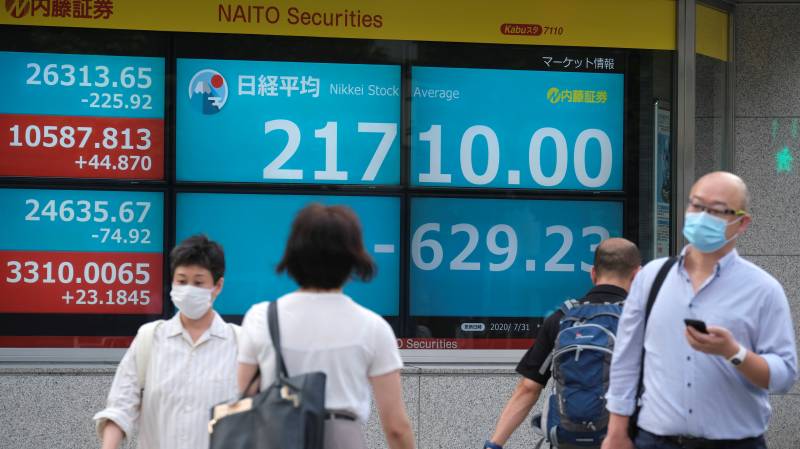Markets mostly down as virus forces new lockdowns

Stay tuned with 24 News HD Android App

Asian and European markets mostly fell Monday with sentiment depressed by a spike in coronavirus infections that has forced fresh lockdowns and sparked worries about the impact on the world economy.
A lack of substantial progress by US lawmakers on a new stimulus package also frustrated traders, while China-US tensions continued as the White House considers measures against Chinese tech firms, citing national security.
With COVID-19 showing no sign of easing globally -- total cases topped 18 million Monday -- governments are moving to reimpose containment measures. Australia's Victoria state imposed fresh, sweeping restrictions Sunday, including a curfew in Melbourne for the next six weeks, a ban on wedding gatherings in the city, and an order that schools and universities go back online in the coming days.
Britain introduced new measures in several northern counties at the end of last week, while there are reports the government is considering fresh moves to avert another economically painful national lockdown, including sealing off London.
The new wave of infections has fanned fears that a nascent economic recovery will be knocked off track. "COVID-19 either remains rampant or is making worrying localised comebacks across the world," said Jeffrey Halley at OANDA.
"Although not priced into financial markets yet, it remains the critical risk factor to global recovery. Particularly if key economies that had previously controlled COVID-19 are forced back into large-scale lockdowns again."
Japan's Nikkei 225 rose more than two percent as investors picked up cheap stocks following a steep drop last week, while there was also some cheer in data showing the country's economy contracted less than first thought in January-March. Shanghai put on 1.8 percent following a forecast-beating reading on factory activity from Caixin, days after a strong official report showed improvement in the manufacturing sector. Seoul edged up slightly.
Congress at loggerheads
However, Hong Kong dropped 0.6 percent as the city continues to see more than 100 infections a day, forcing authorities to put ever-tighter measures in place.
Singapore, Mumbai and Taipei were each off more than one percent. Manila tanked more than three percent after the government said it would shut down the capital and nearby provinces for 15 days after a surge in cases, while Jakarta was off almost three percent. There were also losses in Sydney, Bangkok and Wellington. London, Paris and Frankfurt were all in the red in early trade.
Virus concerns and a weak dollar caused by a massive programme of US monetary easing helped safe-haven gold to a new record Monday, topping out at $1,988.40 before easing back slightly. But AxiCorp's Stephen Innes said: "It's Monday and risk usually starts lousy after investors weekend-soak in COVID-19 headlines then turn better, so we could see a bit of a recovery from here."
In Washington, Democrats and Republicans remain miles away from an agreement on a new stimulus bill, even after supplemental unemployment benefits credited with boosting consumption despite soaring joblessness expired at the end of last week.
"US politicians remain at loggerheads unable to find a common ground for a new virus economic relief package," said Rodrigo Catril at National Australia Bank. "Now around 30 million Americans face the prospect of no income support, harming the US recovery, which was already showing signs of losing momentum."
Adding to the unease on trading floors was Secretary of State Mike Pompeo's warning that the White House will unveil measures against "a broad array" of Chinese-owned software. He said TikTok and other Chinese software companies operating in the US, such as WeChat, feed personal data on American citizens directly to the Chinese Communist Party.
The move would add to a long list of issues that have seen the economic superpowers butt heads -- including Hong Kong, Huawei and the coronavirus -- and fan concerns about a possible renewal of their trade war.
